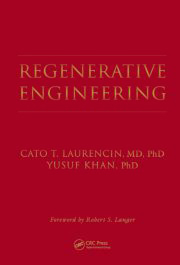 The Institute for Regenerative Engineering has launched a textbook entitled Regenerative Engineering. It explores the development and examination of vital organs and tissue types, addressing concerns as they relate to the regenerative engineering of various organ tissues, vascular tissues, bone, ligament, neural tissue, and the interfaces between tissues. I would like to thank all of the authors for their outstanding contributions. I also thank my mentor, Dr. Robert S. Langer of MIT who contributed the foreword. In addition, I value Dr. Yusuf Khan’s time and effort in putting together this textbook.
The Institute for Regenerative Engineering has launched a textbook entitled Regenerative Engineering. It explores the development and examination of vital organs and tissue types, addressing concerns as they relate to the regenerative engineering of various organ tissues, vascular tissues, bone, ligament, neural tissue, and the interfaces between tissues. I would like to thank all of the authors for their outstanding contributions. I also thank my mentor, Dr. Robert S. Langer of MIT who contributed the foreword. In addition, I value Dr. Yusuf Khan’s time and effort in putting together this textbook.
Academics
Member Spotlight on the AAAS Website
Earlier this year, I received the 2012 Mentor Award from the American Association for the Advancement of Science for mentoring students in biomedical engineering. As a follow-up to that, Dr. Aira Nouri asked me to participate in a brief discussion about my views on the importance of mentoring. Our conversation has been posted on the AAAS website. Mentoring is, for me, one of the most important legacies we leave behind us; and I urge everyone to share both their knowledge and themselves with those who will follow and continue the work we’ve begun.
The CCEI Start-Up Challenge Pitch Competition
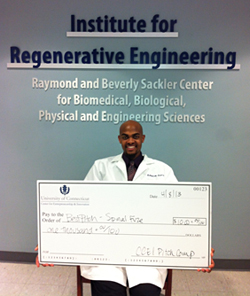 The Connecticut Center for Entrepreneurship and Innovation (CCEI) held its Start-Up Challenge Pitch Competition on April 8 on the Storrs campus. Open to students on all UConn campuses, CCEI awarded a total of $10,000 in prize money to individuals and/or teams across ten categories. Entries ranged from mobile apps for improved access to educational resources to novel material design for improved transportation infrastructure. The organizers challenged students to prepare a 90-second business idea pitch followed by a 2-minute Q&A session.
The Connecticut Center for Entrepreneurship and Innovation (CCEI) held its Start-Up Challenge Pitch Competition on April 8 on the Storrs campus. Open to students on all UConn campuses, CCEI awarded a total of $10,000 in prize money to individuals and/or teams across ten categories. Entries ranged from mobile apps for improved access to educational resources to novel material design for improved transportation infrastructure. The organizers challenged students to prepare a 90-second business idea pitch followed by a 2-minute Q&A session.
I am very proud to announce that our pitch for a novel interbody fusion device won “Best Pitch.” Nicknamed SpineFuze, this is a biodegradable, natural polymer-based interbody fusion device for spinal disc surgery. The team also plans to submit an additional entry for the upcoming written business-plan competition.
The business pitch was delivered by Matthew Harmon, a current 3rd-year Ph.D. student in the Institute for Regenerative Engineering. Matthew is completing his Ph.D. before returning to medical school to continue his pursuit of a career as a physician scientist in orthopaedics. His current research interests involve novel material design for the treatment of spine-related orthopaedic injuries and pathologies.
NSF Louis Stokes Alliance for Minority Participation (LSAMP) Program
I am happy to announce that Ms. Deborah Dorcemus, an IRE graduate student, was recently awarded the National Science Foundation’s prestigious LSAMP Bridge to the Doctorate Fellowship. The LSAMP program is funded by the National Science Foundation and focuses on strengthen the participation, representation and success of underrepresented minorities in the science, technology, engineering, and mathematics (STEM) fields. Fellows receive two years of funding under the program with an additional three years provided by their advisors.
After graduating high school in 2008, Deborah chose to attend the University of Connecticut for her degree in Biomedical Engineering. Throughout her four years of undergraduate work, Deborah was heavily involved with several organizations that promote the professional development and academic success of students and minorities interested in the STEM fields. Deborah also held the positions of secretary, vice president, and president of the UConn chapter of the National Society of Black Engineers.
Upon receiving her Bachelor of Science in May 2012, she decided to continue on her academic path and enrolled in UConn’s Graduate program for her Master’s Degree in Biomedical Engineering with a focus in Tissue Engineering and Regenerative Medicine. With the support of her advisor, Dr. Syam P. Nukavarapu (IRE faculty member), she is nearing completion of her first year of graduate studies. In addition to her lab and school work, Deborah volunteers with the Engineering Graduate Dean’s Office, under the supervision of Aida Ghiaei, and works with students from technical high schools who come to UConn in hopes of becoming engineers. Deborah’s thesis work involves utilizing tissue engineering strategies to develop 3D matrixes that would regenerate osteochondral (functional bone and cartilage) tissue. In order to achieve this, she will use a polymer-hydrogel matrix to deliver growth factors that would cue the tissue to a specific formation. In the end, this structure will serve to replace damaged or arthritic tissue which is an area of great need among the elderly as well as athletes.
Dean’s Distinguished Seminar Series – University of Colorado Denver
On March 19, I served as a guest speaker at the University of Colorado Denver’s School of Medicine. Each year, speakers in various disciples from across the country are invited to participate in the Dean’s Distinguished Seminar series. I spoke on musculoskeletal regenerative engineering and the challenges facing tissue engineering. I also highlighted the emergence of regenerative engineering as a promising new technology to regenerate tissues and organs for our bodies. My thanks to everyone at University of Colorado Denver for their hospitality. I look forward to collaborating with them in the future.
American Association for the Advancement of Science Mentor Award
In mid-February, I was so honored to receive the American Association for the Advancement of Science (AAAS) Mentor Award at a ceremony held during the 2013 AAAS Annual Meeting in Boston. The Mentor Award honors AAAS members who have mentored significant numbers of underrepresented students (such as women, minorities, and persons with disabilities) achieve Ph.D. degrees in the sciences as well as encouraging scholarship, activism, and community-building in science, technology, engineering, and mathematics fields. A very heartfelt thank you to the AAAS for selecting me for this award. I would also like to thank all the students, fellows, residents, and faculty members who have worked with me over the years.

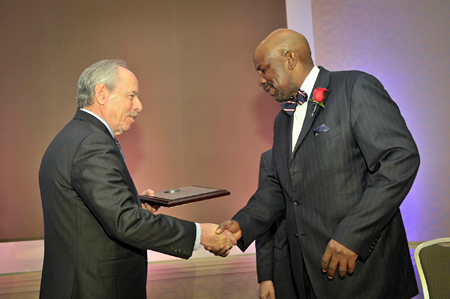
The Basore Distinguished Lecture at Auburn University
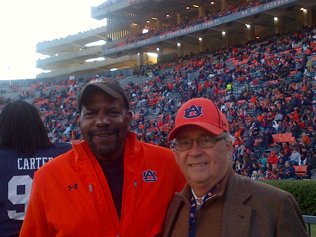 Last month, I was honored to deliver the Basore Lecture at Auburn. I appreciated the warm hospitality provided by the entire school. I want to thank Professor Mario R. Eden, Chairman of the Chemical Engineering for hosting me. During the visit, I also had the opportunity to join my friend and colleague, Dr. James Andrews a world-renowned orthopaedic surgeon on the Auburn football team sidelines.
Last month, I was honored to deliver the Basore Lecture at Auburn. I appreciated the warm hospitality provided by the entire school. I want to thank Professor Mario R. Eden, Chairman of the Chemical Engineering for hosting me. During the visit, I also had the opportunity to join my friend and colleague, Dr. James Andrews a world-renowned orthopaedic surgeon on the Auburn football team sidelines.
Elizabeth Hurlock Beckman Award
 I was proud to receive the prestigious Elizabeth Hurlock Beckman Award last month in Atlanta, Georgia. It recognizes individuals who have worked to inspire their students to be mentors themselves. I was nominated by my former student Dr. Saadiq El-Amin who is currently a professor of orthopaedic surgery at Southern Illinois University who is mentoring a new generation of students and individuals in the community. I am grateful to Dr. El-Amin and the Elizabeth Hurlock Beckman Award Advisory Committee for this award.
I was proud to receive the prestigious Elizabeth Hurlock Beckman Award last month in Atlanta, Georgia. It recognizes individuals who have worked to inspire their students to be mentors themselves. I was nominated by my former student Dr. Saadiq El-Amin who is currently a professor of orthopaedic surgery at Southern Illinois University who is mentoring a new generation of students and individuals in the community. I am grateful to Dr. El-Amin and the Elizabeth Hurlock Beckman Award Advisory Committee for this award.
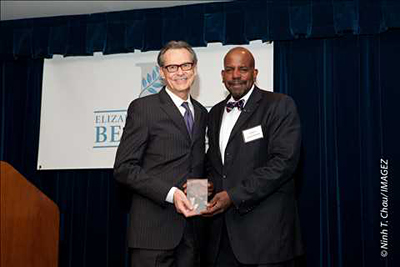
Pirkey Lectureship at the University of Texas, Austin
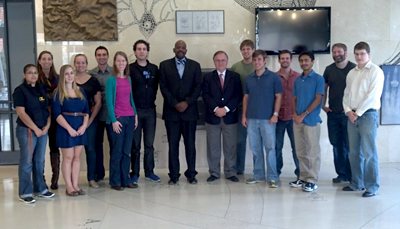 It was my honor and privilege to serve as Visiting Professor in the Department of Chemical Engineering at the University of Texas, Austin. During the visit, I delivered the Pirkey lectureship entitled “Musculoskeletal Regenerative Engineering: Taking on the Grand Challenges.” My talk highlighted the tremendous work being carried out here at the Institute for Regenerative Engineering. More specifically, I discussed the unprecedented strides predicted for the next decade in regenerating musculoskeletal tissues, a move from an era of advanced prosthetics to what we terms “Regenerative Engineering.”
It was my honor and privilege to serve as Visiting Professor in the Department of Chemical Engineering at the University of Texas, Austin. During the visit, I delivered the Pirkey lectureship entitled “Musculoskeletal Regenerative Engineering: Taking on the Grand Challenges.” My talk highlighted the tremendous work being carried out here at the Institute for Regenerative Engineering. More specifically, I discussed the unprecedented strides predicted for the next decade in regenerating musculoskeletal tissues, a move from an era of advanced prosthetics to what we terms “Regenerative Engineering.”
I so appreciated the hospitality provided by the university and I thank Professor Nicholas A. Peppas, Professor of Chemical Engineering, Biomedical Engineering and Pharmacy Chair of the Department of Biomedical Engineering, in particular, for inviting me to visit this great institution.
Congratulations to Ami and Ashley Amini, the Institute for Regenerative Engineering’s Combined D.M.D./Ph.D. Students!
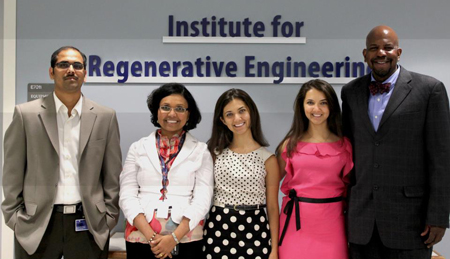
In June, they successfully defended their Ph.D. theses and completed their Ph.D. work. Not only did they produce outstanding research work in our institute resulting in papers published in several prestigious journals, they each competed for and received highly selective NIH individual grants for their training. Ami and Ashley are now focused on their D.M.D. program. I am very proud of Ami and Ashley and applaud their achievements.